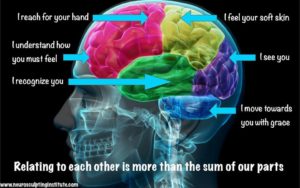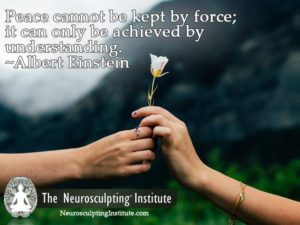22 Dec 5 Tips to Wire for Compassion
During this time, we could all use more understanding and relating to one another. Did you know that requires a healthy prefrontal cortex (PFC) otherwise we will biologically default to our fight-or-flight response? It’s simply in the way we are wired. Relating to one another with understanding and compassion triggers different parts of our brains.

In today’s busy world, we are living in a time of transition and a sometimes-challenging call to higher levels of relating to one another with compassion and empathy. Learning tasks to train our brain to be wired toward compassion and empathy is simple yet it’s not easy as it takes practice and repetition to build new neural pathways.
Here are 5 tips you can begin today in keeping your PFC healthy and wired toward compassion and understanding in our movement towards greater peace for tomorrow.
1. Eat healthy fats
2. Meditate for five minutes
3. Do an mind-engaging task, puzzle, or new and fun activity
4. Brush your teeth with your non-dominant hand
5. Choose a new route to work
Finding peace within is a choice we can exercise even in times of conflict. Priming our neural pathways toward empathy and compassion is the first step. To learn more about wiring your brain for peace and compassion, visit our Free Learning Library at our Neurosculpting Institute Online Learning store.

To learn more about Neurosculpting® 5-step brain training meditation process, consider starting your 2017 with me for a transformational online 6-week Immersion into Practical Neurosculpting® with Founder, Lisa Wimberger, beginning January 11, 2017. No experience necessary.
Bio:

Lisa Wimberger is the founder of the Neurosculpting® Institute. She holds a Masters Degree in Education, a Foundations Certification in NeuroLeadership, and Certificates in Medical Neuroscience, Visual Perception and the Brain, and Neurobiology. She is the author of NEW BELIEFS, NEW BRAIN: Free Yourself from Stress and Fear, and NEUROSCULPTING: A Whole-Brain Approach to Heal Trauma, Rewrite Limiting Beliefs, and Find Wholeness. As the Founder of the Neurosculpting® modality Lisa runs a private meditation practice in Colorado teaching clients who suffer from stress disorders, and she is a faculty member of Kripalu Yoga and Meditation Center, the Law Enforcement Survival Institute, Omega Institute, and 1440 Multiversity. To find out more, visit www.NeurosculptingInstitute.com



